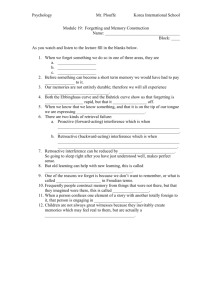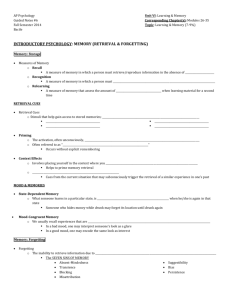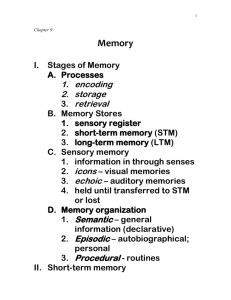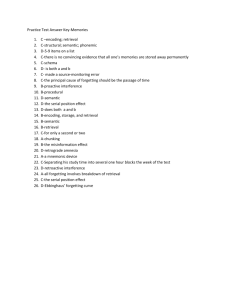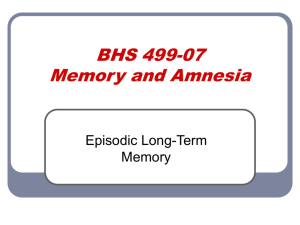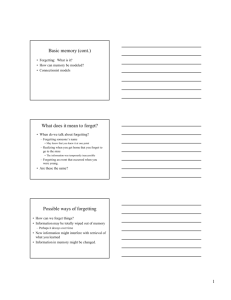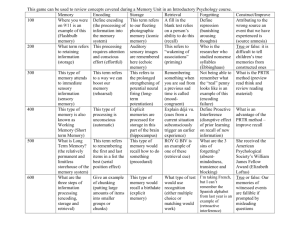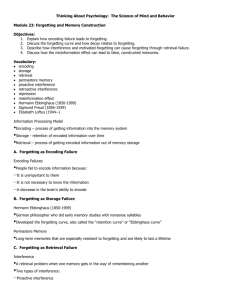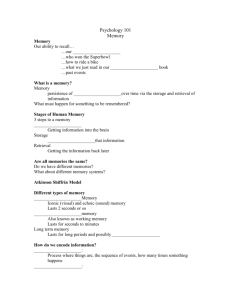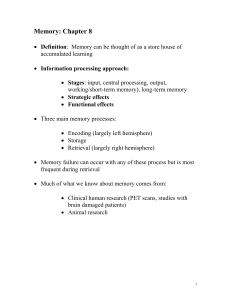Chapter 1 - Oxford University Press
advertisement
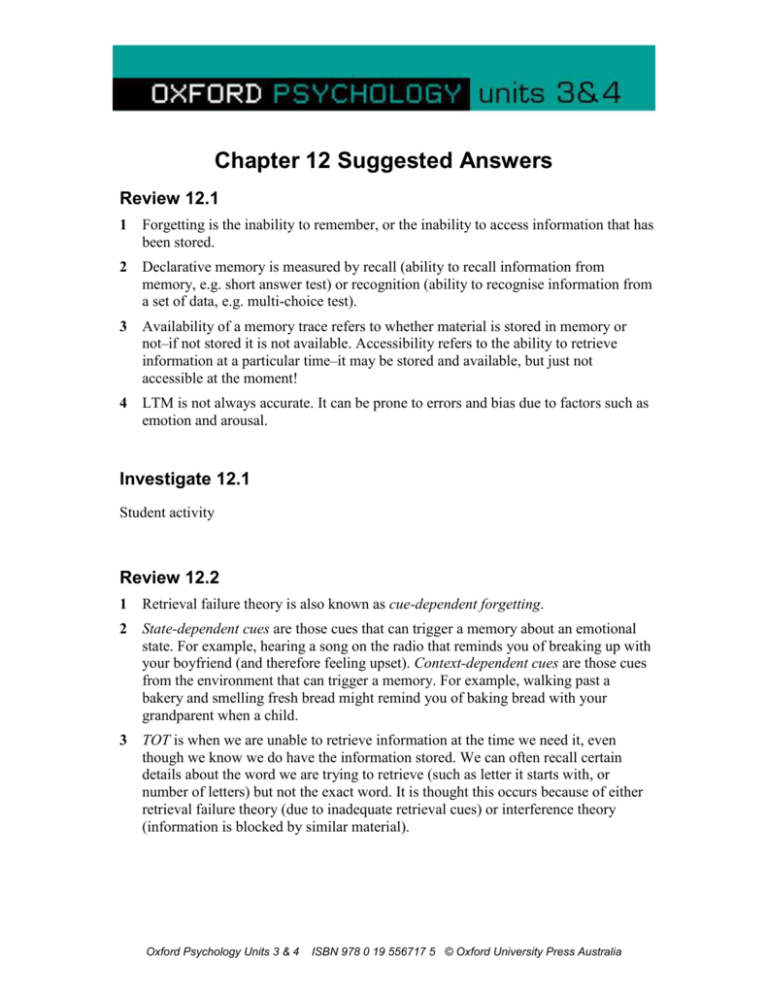
Chapter 12 Suggested Answers Review 12.1 1 Forgetting is the inability to remember, or the inability to access information that has been stored. 2 Declarative memory is measured by recall (ability to recall information from memory, e.g. short answer test) or recognition (ability to recognise information from a set of data, e.g. multi-choice test). 3 Availability of a memory trace refers to whether material is stored in memory or not–if not stored it is not available. Accessibility refers to the ability to retrieve information at a particular time–it may be stored and available, but just not accessible at the moment! 4 LTM is not always accurate. It can be prone to errors and bias due to factors such as emotion and arousal. Investigate 12.1 Student activity Review 12.2 1 Retrieval failure theory is also known as cue-dependent forgetting. 2 State-dependent cues are those cues that can trigger a memory about an emotional state. For example, hearing a song on the radio that reminds you of breaking up with your boyfriend (and therefore feeling upset). Context-dependent cues are those cues from the environment that can trigger a memory. For example, walking past a bakery and smelling fresh bread might remind you of baking bread with your grandparent when a child. 3 TOT is when we are unable to retrieve information at the time we need it, even though we know we do have the information stored. We can often recall certain details about the word we are trying to retrieve (such as letter it starts with, or number of letters) but not the exact word. It is thought this occurs because of either retrieval failure theory (due to inadequate retrieval cues) or interference theory (information is blocked by similar material). Oxford Psychology Units 3 & 4 ISBN 978 0 19 556717 5 © Oxford University Press Australia Review 12.3 1 Repressed memory was proposed by Sigmund Freud, and based upon his theory of psychoanalysis. He suggested that repression of distressing memories prevented them from coming into our consciousness. 2 Suppression is a conscious attempt to push memories that are hurtful or distressing into the back of our mind, but we know they are there. Repression is an unconscious action where painful memories are pushed into a part of the mind where it is not accessible. The person is unaware these memories exist. Review 12.4 Questions 1 & 2 relate to the following table: Theories of Forgetting Theory of forgetting Definition Key elements Retrieval failure theory When we are unable to access information when we need it due to inadequate cues; also known as cue dependent forgetting. Information is not lost, but accessibility is lost. We can still forget information, even with correct cues. Interference theory When we have difficulty retrieving information because of the similarity of material learnt previously (proactive interference) or since (retroactive interference). Information competes for accurate encoding and storage of material. Experimental studies have used tests of recall, which are particularly prone to interference; does not relate to all types of memory. Decay theory Suggests memory traces fade over time if not used. Physiological cause (decay of neurons/ synapses leading to loss of communication between them). Does not account for sudden recollection of memories or for memories that can be recalled following a long period of not being used. Motivated forgetting When memories are difficult to retrieve because they are painful. May be suppressed (conscious) or repressed (unconscious). Psychological process that occurs when we have a reason to forget. Memory recall can be influenced and changed by misinformation, so recalled memories may not be correct; lack of experimental research to support Freud’s theory. Oxford Psychology Units 3 & 4 Criticisms ISBN 978 0 19 556717 5 © Oxford University Press Australia Investigate 12.2 Student activity Test your Understanding 1 a 2 d 3 b 4 b 5 a 6 d 7 d 8 c 9 a 10 c 11 a 12 d 13 d 14 a 15 Psychology followed by Australian History; English followed by Biology 16 Interference 17 Retroactive interference 18 Encoding; stored 19 20 21 22 23 24 25 Repression Lack of attention and material, therefore not encoded Interference Suppression Interference Suppression Never having learned the information (due to lack of attention) Oxford Psychology Units 3 & 4 ISBN 978 0 19 556717 5 © Oxford University Press Australia
